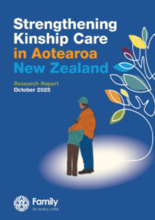This report presents findings from a small-scale qualitative study commissioned by Family for Every Child, examining how kinship care is understood and experienced in Aotearoa New Zealand. It explores the challenges faced by kinship carers and their support needs. The research also situates Family for Every Child’s (2024) global best practice guidelines within the New Zealand context, guided by a commitment to decolonising knowledge and practice. This study is underpinned by Te Tiriti o Waitangi (the founding document of Aotearoa New Zealand) and international human rights frameworks, including the United Nations Convention on the Rights of the Child 1989 (UNCRC), United Nations Declaration of the Rights of Indigenous People 2007, and United Nations Convention on the Rights of Persons with Disabilities 2006 (UNCRPD).
This study explored informal and formal kinship care in Aotearoa New Zealand (excluding State care), guided by four key research questions:
- What are the unique cultural definitions and understandings of kinship care in Aotearoa New Zealand?
- What challenges do kinship carers face in providing stable, long-term care for tamariki and rangatahi?
- Which supports are most effective in enabling kinship carers to nurture and sustain whānau-based care?
- How can care reform be guided by principles of children’s rights and decolonisation to better serve the needs of Māori children and their whānau?

